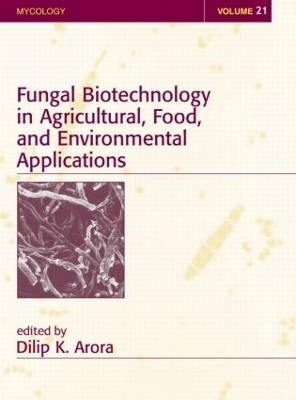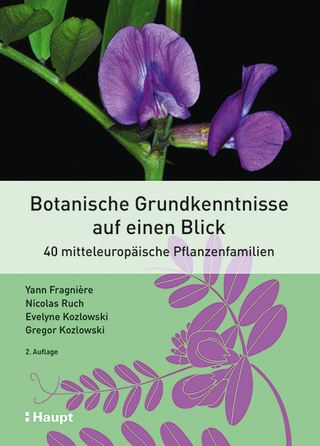
Fungal Biotechnology in Agricultural, Food, and Environmental Applications
Crc Press Inc (Verlag)
978-0-8247-4770-1 (ISBN)
Contributions from 80 world-renowned authorities representing a broad international background lend Fungal Biotechnology in Agricultural, Food, and Environmental Applicationsfirst-class information on the biotechnological potential of entomopathogenic fungi and ergot alkaloids, applications of Trichoderma in disease control, and the development of mycoherbicides. Additional topics include fungal control of nematodes, control of plant disease by arbuscular mycorrhizal fungi, strategies for controlling vegetable and fruit crops, molecular biology tactics with mycotoxigenic fungi and the development of biofungicides, production of edible fungi, fermented foods, and high-value products like mycoprotein.
Dilip K. Arora is a Director with the National Bureau of Agriculturally Important Microorganisms, New Delhi, India, as well as Professor of Microbiology and Mycology at the Centre of Advanced Study in Botany, Banaras Hindu University, Varanasi, India. The author or coauthor of over 90 research papers, review articles and book chapters in international scientific journals and books, he serves on the editorial boards of more than a half dozen journals and has helped organize numerous conferences and symposia worldwide. Dr. Arora is the coeditor of Chemical Fungal Taxonomy; Handbook of Applied Mycology, V.1: Soils and Plants; V.2: Humans, Animals and Insects; V.3: Foods and Feeds and V.5: Mycotoxins in Ecological Systems (all titles, Marcel Dekker, Inc.). His current research interests include molecular interaction between fungi and molecular detection of plant pathogenic fungi. Dr Arora received the M.Sc. (1974) and Ph.D. (1977) degrees in botany from Banaras Hindu University, Varanasi, India.
Agricultural biotechnology: a biotechnological approach to plant protection with fungi; chemical identification of fungi - metabolite profiling and metabolomics; isozyme analysis in fungal taxonomy, genetics and population biology; molecular methods for identification of plant pathogenic fungi; the application of molecular markers in the epidemiology of plant pathogenic fungi; molecular biology in the control of mycotoxigenic fungi; biotechnological potential of entomopathogenic fungi; biotechnological potential of ergot alkaloids; fungi as plant growth promoter and disease suppressor; challenges and strategies for development of mycoherbicides; biofungicides from microbial metabolites; molecular biology of biocontrol trichoderma; the biological control agent trichoderma - fundamentals to applications; biotechnological strategies to control fungal diseases of vegetables; control of postharvest fruits using microbes; arbuscular mycorrhizal fungi in plant disease control; commercialization of arbuscular mycorrhizal biofertilizer; control of nematodes by fungi. Food and feeds: fungi in food technology - an overview; role of fungi in fermented foods; production of edible fungi; mycoprotein and related high-value products from yeasts and fungi; diversity and genetic variability of yeasts involved in wine fermentation; yeast in the dairy industy; flavours and aroma; antifungal food additives; molecular detection of fungi in foods and feeds; the role of spoilage fungi in seed deterioration; mycotoxin chapter; genetics and biochemistry of toxin synthesis. Environmental biotechnology: cellulose degradation by fungi; the importance of wood decay fungi in forest ecosystems; the biodegradation of lignocellulose by white rot fungi; biomineralization of heavy metals; decolouration of industrial waste and degradation of dye water; bioconversion of distillery waste by fungi; degradation of hydrocarbons by yeasts and filamentous fungi; biodegradation of azo dyes by fungi; fungal degradation of explosives; restoration of mycorrhizae in disturbed arid ecosystems.
| Erscheint lt. Verlag | 17.12.2003 |
|---|---|
| Reihe/Serie | Mycology |
| Verlagsort | Bosa Roca |
| Sprache | englisch |
| Maße | 210 x 280 mm |
| Gewicht | 1496 g |
| Themenwelt | Naturwissenschaften ► Biologie ► Botanik |
| Naturwissenschaften ► Biologie ► Mikrobiologie / Immunologie | |
| Naturwissenschaften ► Biologie ► Mykologie | |
| Naturwissenschaften ► Biologie ► Ökologie / Naturschutz | |
| Technik ► Umwelttechnik / Biotechnologie | |
| Weitere Fachgebiete ► Land- / Forstwirtschaft / Fischerei | |
| ISBN-10 | 0-8247-4770-4 / 0824747704 |
| ISBN-13 | 978-0-8247-4770-1 / 9780824747701 |
| Zustand | Neuware |
| Haben Sie eine Frage zum Produkt? |
aus dem Bereich


